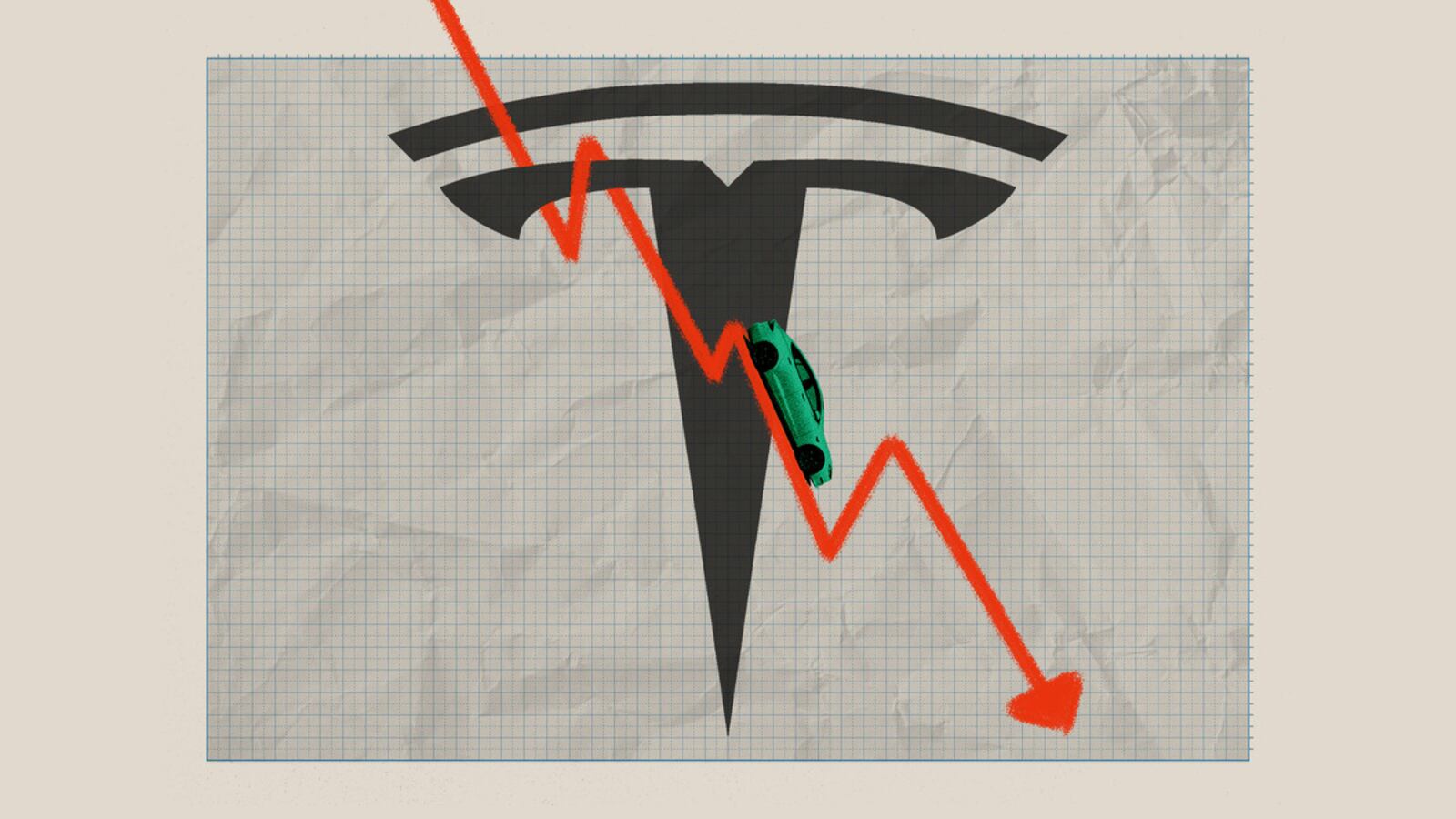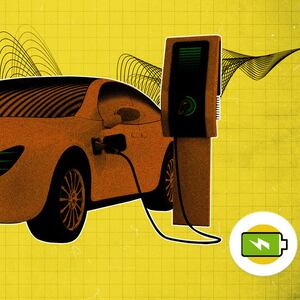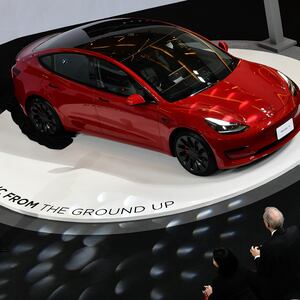Tesla had a rough 2022—to say the least.
Everything from the economy, to inflation, to the Russian invasion of Ukraine dealt body blow after body blow to the electric carmaker—and the rest of the tech and auto industry at large. However, the recent actions of company CEO Elon Musk, following his reluctant purchase of Twitter, have only dragged the beleaguered Tesla further into the deep trenches of a financial crisis. In fact, Tesla has lost nearly 70 percent of its market cap over the year to date.
It’s a whiplash shift from just a year ago when the company, valued at an eye-popping $1 trillion, seemed like it could do no wrong. Some are questioning Musk’s leadership, while others are going further—speculating that this might just be the beginning of the end of Tesla.
There’s no denying the impact that the company has had in both producing and selling electric cars. After all, it did something that once seemed impossible: convincing the public that EVs are pretty damn cool, actually. Now legacy automakers are playing catchup to get customers to buy their own takes on electric cars.

Tesla revolutionized the way the world sees and drives EVs—but with its back against the wall and the financial situation looking more and more bleak by the tweet, we might very well soon find ourselves in a situation where the biggest name in the game has gone belly up.
Let’s be clear: there’s a fairly low chance of that happening… but what if it does?
How to Make (and Burst) an EV Bubble
To understand the impact Tesla’s disappearance would have on the future of EVs, it’s important to wrap our minds around how exactly we got here.
“I give Elon Musk a lot of credit. He almost single-handedly made electric vehicles glamorous and sexy,” Ragunathan “Raj” Rajkumar, a professor of electrical and computer engineering and autonomous vehicle researcher at Carnegie Mellon University, told The Daily Beast. “People associated them with the person who was transforming the automotive industry and doing the right thing for the planet.”
However, this was a double-edged sword. Musk hyped Tesla up through lofty—if a bit unrealistic—promises and shitposts on Twitter. He cultivated an army of Elon stans willing to go to war for him online to defend his companies from the smallest of slights. Meanwhile, the cars were finally selling well. All this resulted in the perfect mixture to fuel the rise of Tesla’s stock into the stratosphere like so many SpaceX rockets.
But the value was always tenuous at best. It’s not like other automakers weren’t ever going to make electric cars. So Tesla’s market cap became a bubble of epic proportions.
One of the people who held a needle was Musk himself—which he wound up popping with the acquisition of his favorite social media platform, Twitter.
“It was just complete baloney,” Rajkumar added. “At the end of the day, business has to be a business. Sooner or later, things that go up have to come down, and that’s what we're seeing, and will continue to see.”
There’s also fundamental economic factors. Demand is low across the board due to a flailing economy. Plus the market looks vastly different than it did even a year ago. Tesla’s not the only horse in the race anymore. The EV industry is much bigger now, and with the added competition, it was really only a matter of time that Musk’s company started feeling the pressure.

That sink in feeling: Elon Musk’s takeover of Twitter unintentionally caused further turmoil and instability for Tesla’s finances.
GettyA World Without Tesla
Given the profound impact of Tesla on the automotive industry and consumer habits, there’s really no question that it would have a profoundly negative impact on the future of EVs.
“If Tesla collapses and they’re completely out of business, I believe that there’ll be dancing in the streets at every giant [automaker] on the planet,” Sandy Munro, an independent automotive engineer, consultant, and industry expert, told The Daily Beast.
Munro’s known for his famous teardown reports providing incredibly detailed analysis of different vehicles. His glowing review of Tesla’s Model Y in 2020 resulted in him not only being bullish on the future of the company but also electric vehicles in general. A few years ago, he predicted that EVs would make up more than 50 percent of total vehicles on the market by 2030. Due to Tesla’s success, he’s updated that prediction to 2028.
However, Munro admits that, if Tesla were ever to go bankrupt, neither prediction would likely ever happen and he would “definitely walk away from EVs.”
That’s because, to him, the fall of Tesla would put out the proverbial fire underneath the asses of every legacy automaker to pivot to new, emerging technologies—and instead, incentivize them to go back to old ones. No longer would there be the push to build new plants and devote so much of their resources into R&D for batteries, charging stations, and electric powertrains. Even regulators would have much less incentive to make the change in the nation’s transportation and energy infrastructure.
Overall, we’d see a return to our gas-guzzling, greenhouse gas emitting normal. “If Tesla goes out of business, you watch how fast that Keystone pipeline goes through,” Munro added.
Rajkumar’s assessment isn’t quite as dire. He believes that the technologies and innovations that Tesla has championed will ultimately continue. After all, consumers already want EVs more than ever—and that number is only expected to grow. Car companies see this too, and are ready to capitalize on it.
“The global automotive industry has been emphasizing EVs now, and many companies are publicly announcing that they will switch to a completely electric line of products. I don't think it’s going to stop anytime soon.,” Rajkumar said. However, he concedes that it’s not clear if many of the goals outlined by these automakers are realistic due to an inadequate charging infrastructure and a slow rate of EV adoption by consumers overall.
The only real winner that would emerge from the death of Tesla would be China. The country is already making a concerted effort towards electrifying its transportation infrastructure, with goals to have 40 percent of all vehicles sold domestically be EVs by 2030, and have enough charging stations to service more than 20 million vehicles.
Munro said that this might cause a kind of geopolitical tortoise-and-hare situation where China plays catchup and soon advances much more exponentially than the Western world, eventually eclipsing the sleeping U.S. with technologies like EVs that will be vital for our collective future.
“China will survive,” Munro explained. He added that we might get to the point where the U.S. has relatively little EVs because we were so focused on short term gains.

Employees work on the assembly line of electric vehicles at a factory of Dayun Automobile Co., Ltd on Dec. 8, 2022 in Yuncheng, Shanxi Province of China.
GettyTesla Will Die Another Day
The future might seem a bit uncertain for Tesla—but it will likely survive its current downturn. Sure, it might not reach the $1 trillion zenith it hit last year (at least, for a while) but it will probably see this through.
“There’s no way Tesla is going to go belly up,” Munro said. “It’s just not going to happen.” He added that there are two primary factors why the company will keep driving along.
The first is actually Musk. Though many might be bothered by his antics on Twitter (Tesla stock investors chief among them), there’s no denying that he helped revolutionize and championsome of the very industries that the world will be relying on the most in the future: electric cars and space travel. If he can pull himself away from the social media albatross that he’s wrapped around his neck, he might be able to help usher Tesla through a rapidly crowding EV market and beyond 2030.
The second, said Munro, is children. Yes, children. He believes that kids—more than any other market indicator, stock trend, or McKinsey consultant—accurately point the way for the future of things like automobiles and, therefore, Tesla.
“If you talk to kids, all of a sudden you understand what they don’t like,” he said. “‘I don’t like the smell of gasoline. I don’t like the black smoke coming out of the car. I want to do more for the environment.’ That’s why I don’t think Tesla is going away.”







